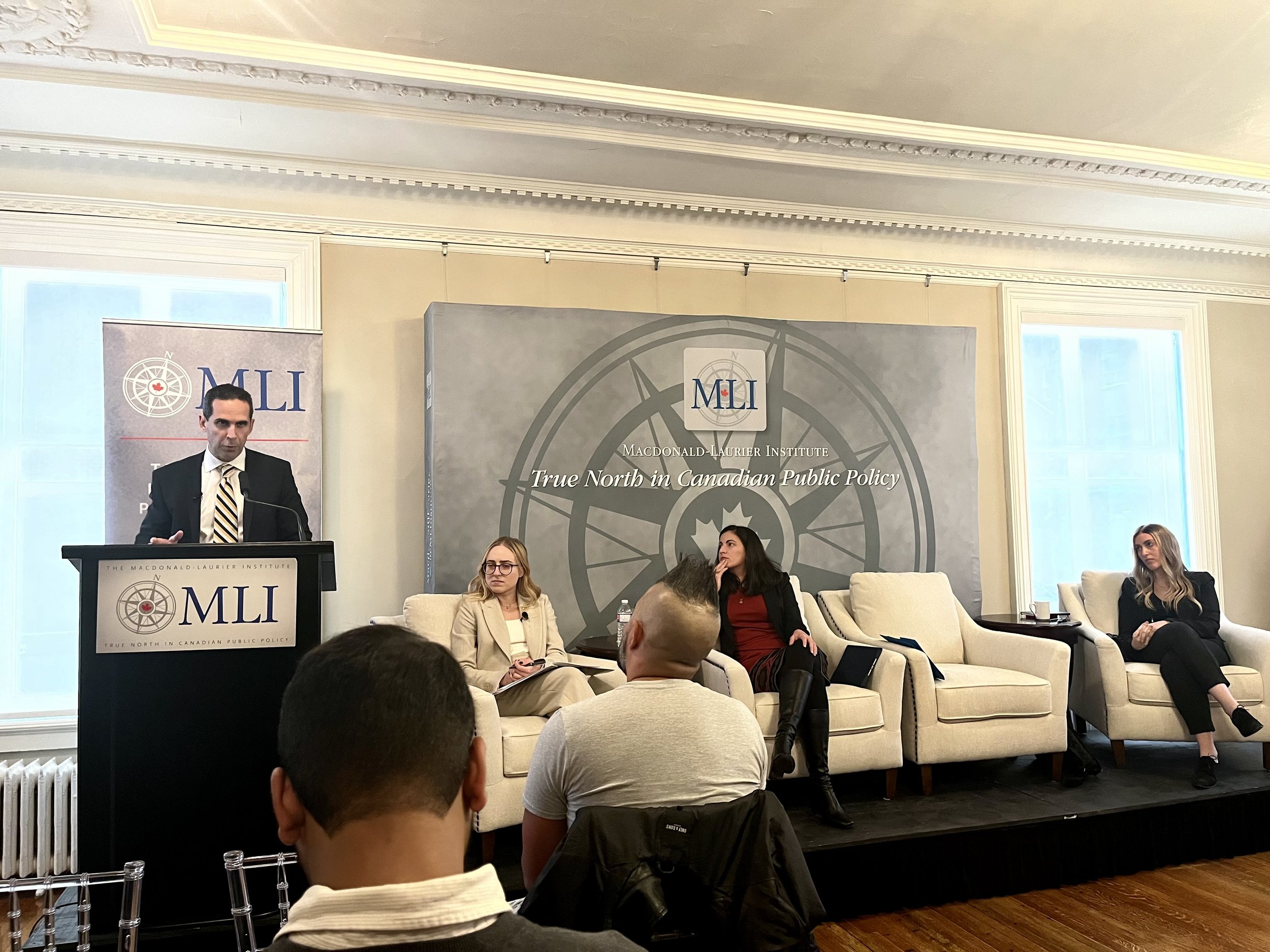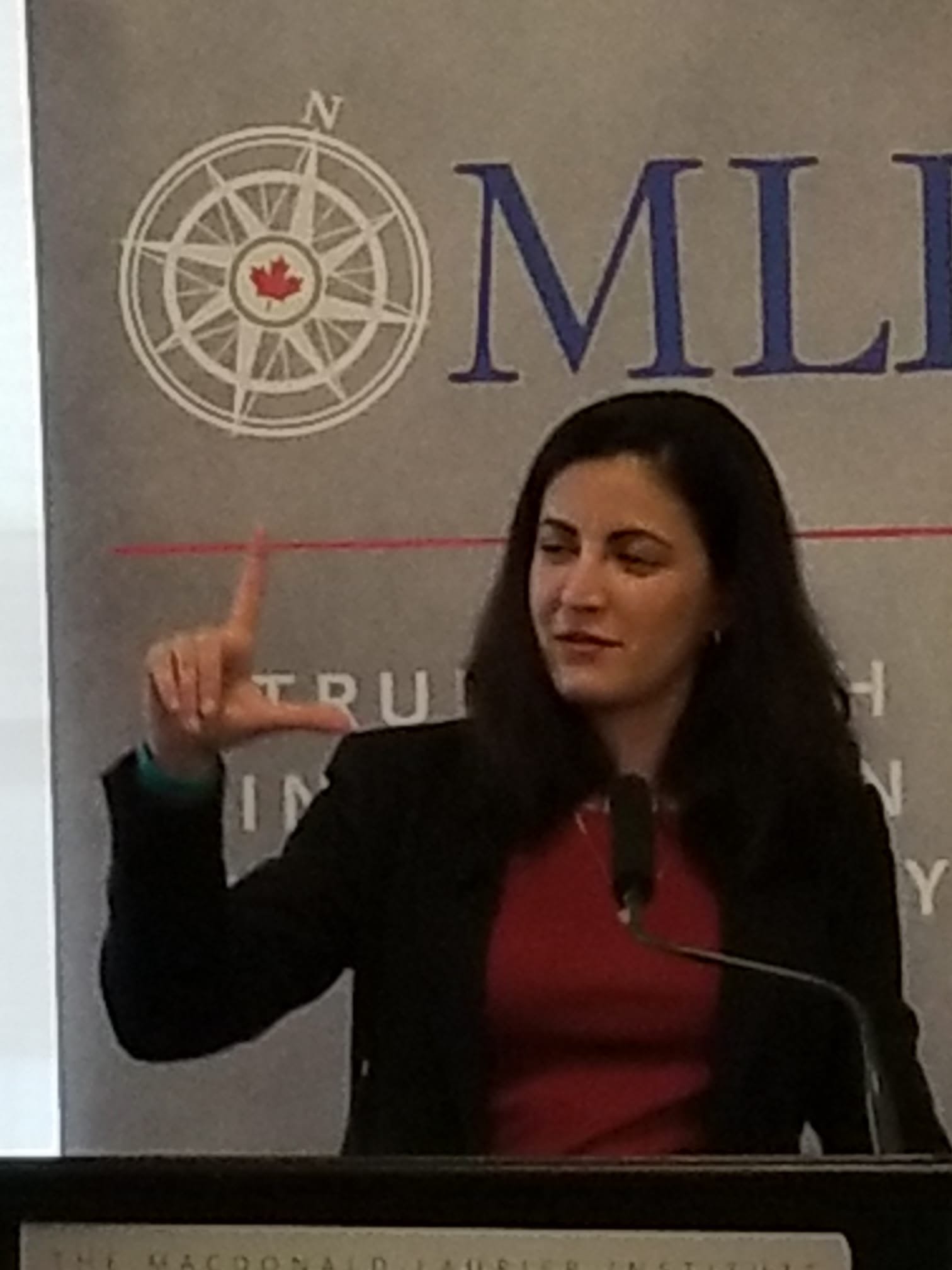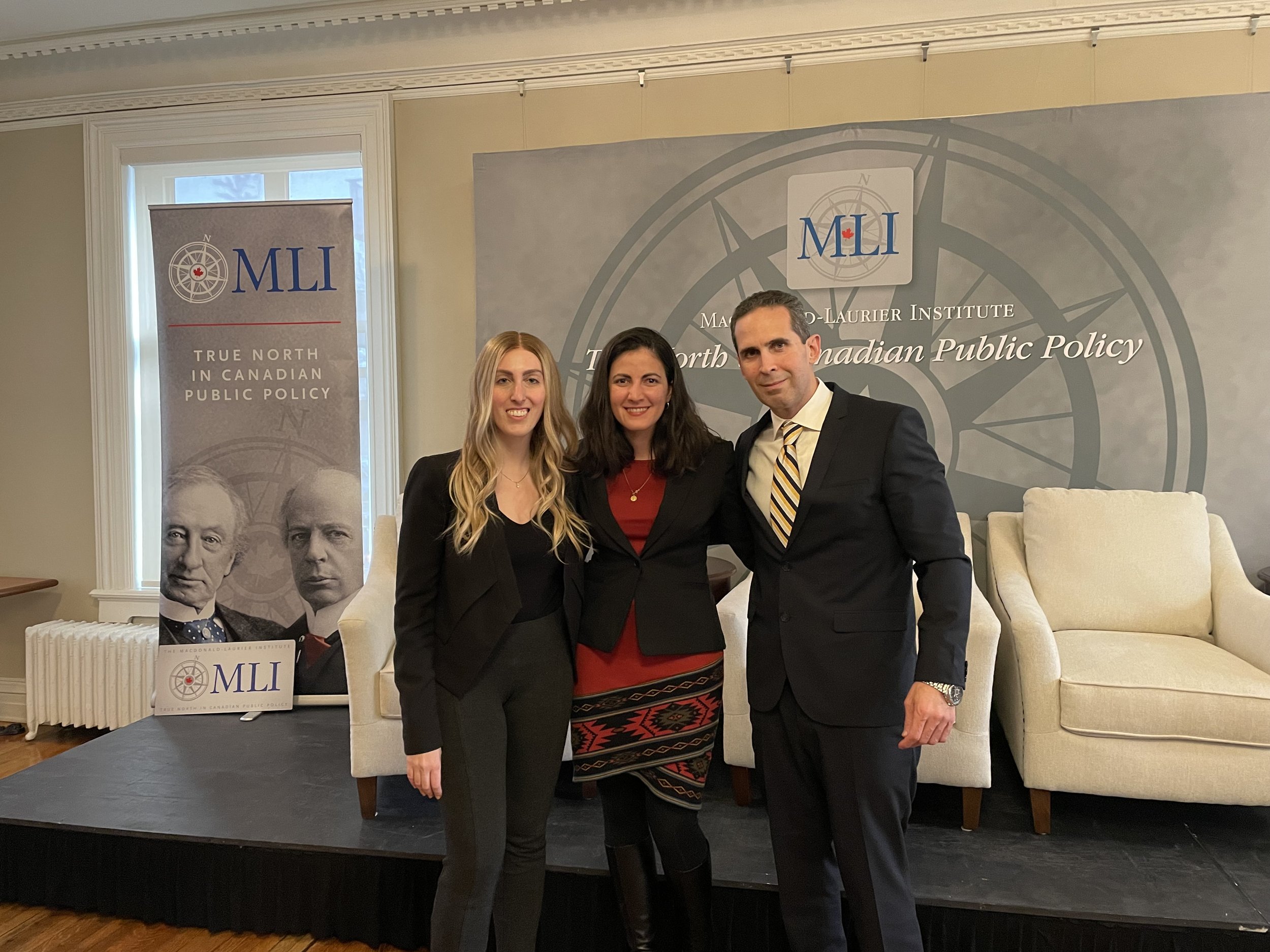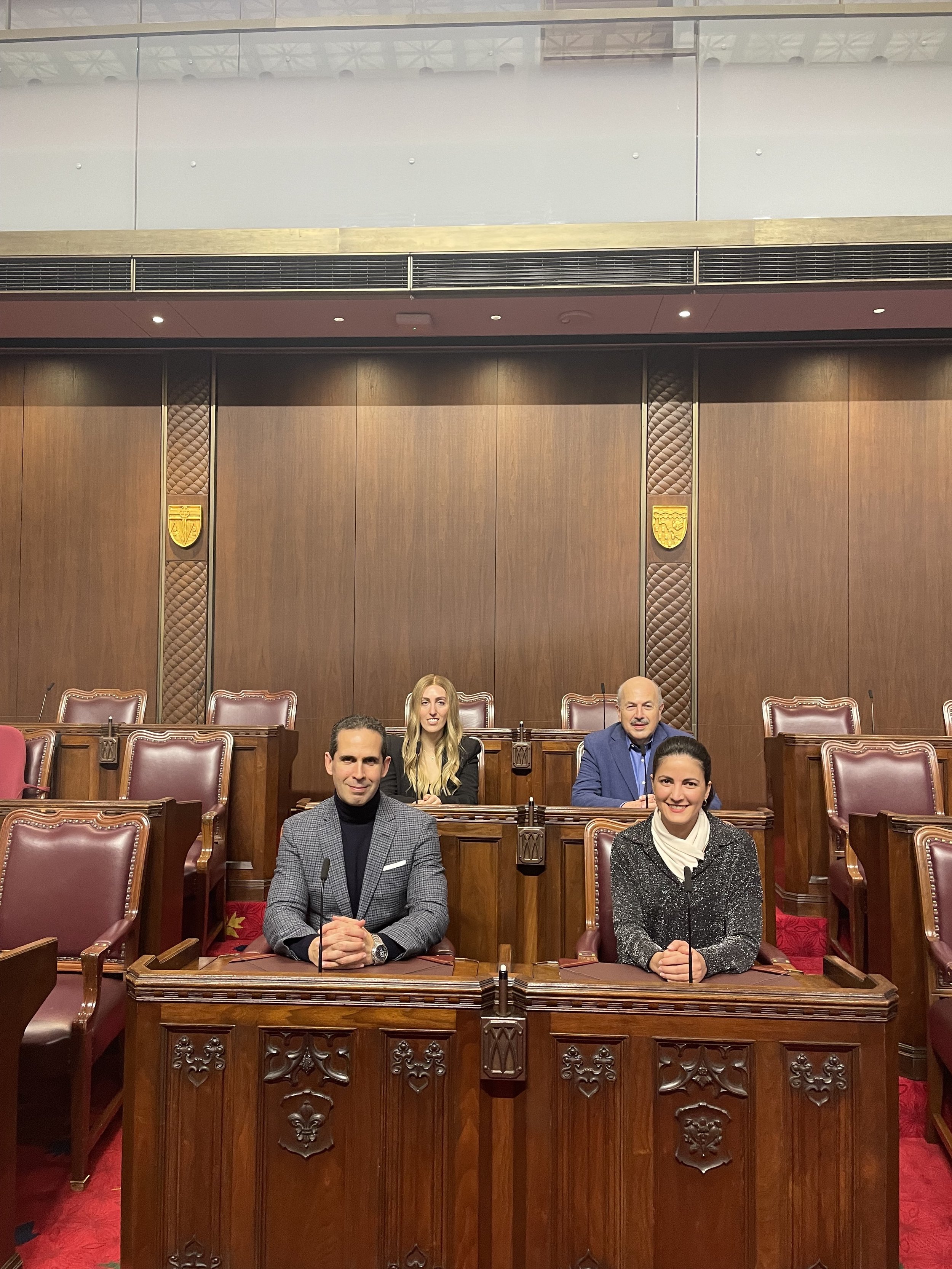EVENTS IN OTTAWA, CANADA IN SOLIDARITY WITH DEMOCRACY IN CUBA
During the week of November 14, 2022, representatives of Democratic Spaces, the citizen initiative Cubadecide and the Panamerican Foundation for Democracy held multiple initiatives to expose the Cuban dictatorships’s responsibility in trampling on human rights in Cuba as well as links between the Cuban regime and authoritarian regimes in China, Rusia, Iran.
Event held at the Macdonald-Laurier Institute in Ottawa titled: “Canada and Cuba In the Context of Expanding Global Authoritarianism.”
Request to Global Affairs Canada for Magnitsky Sanctions on gross human rights abusers in Cuba.
EXPOSURE IN CANADA
INTERNATIONAL MEDIA EXPOSURE:
Diario de las Americas, Yahoo Noticias, Telemundo 51, Cubanet; Martí Noticias; ADN Cuba (I); 14 y Medio; Diario de Cuba; Swiss Info; ICLEP; CiberCuba; TFLGlobal; ADN Cuba (II)
In pursuit of justice and accountability for the thousands of victims beaten, persecuted, imprisoned and tortured over their participation in the July 11, 2021 pro democracy protests in Cuba, we presented a request for Magnitsky sanctions on 10 high officials of the Cuban regime and two entities responsible for gross human rights violations in connection with the nation wide crackdown of the July 11 protests.
The Prime Minister of Canada Justin Trudeau and the Minister of Foreign Affairs have publicly condemned the crackdown on the July 11 protests in Cuba. Therefore, the next coherent step for the Government of Canada is to backup statements with actions and impose targeted sanctions as Canada has done with over 21 authoritarian regimes around the world.
The people of cuba live in a state of defencelessness, deprived of access to an independent judicial system or independent media to expose high officials in the Revolutionary Armed Forces, and the Interior Ministry responsible for killings, persecution and tortures. Thousands of people are jailed in Cuba in retaliation for exercising fundamental human rights. Political prisoners are subjected to numerous methods of tortures including denial of medical assistance and prolonged isolation in punishment cells.
Similarly, critics of the regime are forced to house arrest and surrounded by police on a frequent basis, limiting their movements and violating their fundamental human rights. Thousands of Cuban families have been turned apart by the political imprisonment of their loved ones. Members of the Interior Ministry including National Police, State Security, Coast Guard, Black Berets as well as enablers of repression in the Armed Forces such as the Red Berets are legally protected from perpetrating the worst human rights abuses.
Magnitsky sanctions would therefore be a key measure of justice and accountability. Canada has for decades recommended the Cuban regime to respect human rights, stop arbitrary arrests and legalize NGOS but enablers of repression in Cuba have turned a deaf ear to Canada. Cuba is in fact today more repressive than several decades ago.
With new amendments to Magnitsky sanctions, any assets seized on sanctioned officials can be sold and proceeds repurpose to compensate for victims of repression in Cuba. Victims of repression in Cuba need reparation and justice amidst crimes. Canada’s principle foreign policy approach needs to be applied in the case of Cuba.
PRESS RELEASE: Democratic Spaces and the Cuba Decide Promoters Request the Imposition of Targeted Sanctions on Cuban Officials and Entities
November 14, 2022
Today, Democratic Spaces and the Cuba Decide promoters have filed a joint request for the imposition of targeted sanctions on twelve (12) Cuban officials and entities responsible for gross violations of human rights, particularly in the aftermath of the July 11, 2021 peaceful protests. These officials and entities are:
Brigada Especial Nacional of the Interior Ministry (The Black Berets of the Interior Ministry)
Tropas de Prevención of the Revolutionary Armed Forces (The Red Berets of the Revolutionary Armed Forces)
Miguel Díaz-Canel
Álvaro López Miera
Lázaro Alberto Álvarez Casas.
Oscar Callejas Valcárcel
Eddy Manuel Sierra Arias
Pedro Orlando Martínez Fernández
Roberto Abelardo Jimenez Gonzalez
Roberto Legrá Sotolongo
Andres Laureano González Brito
Romárico Vidal Sotomayor García
On July 11, 2021, the people of Cuba came together in one of the largest peaceful protests in recent Cuban history. Hundreds of thousands of Cubans took to the streets to demand freedom and democracy. Pro-freedom protests continue to this day.
In response, the Cuban regime cracked down in violent repression. Cuban state officials committed so many arbitrary arrests in the aftermath of the protests that Cuba is now the leading jailer of political prisoners in the Americas. It is estimated that between 2,000 and 8,000 people were arrested across Cuba. As of October 31 2022, 1,027 persons, including 34 minors, are still detained or imprisoned since the July 11 protests. Use of arbitrary detention became so severe that the UN Committee on Enforced Disappearances initiated urgent action for 187 cases in Cuba under Article 30 of the Convention on Enforced Disappearances. Human Rights Watch found systematic use of “arbitrary detention, ill-treatment of detainees, and abuse-ridden criminal prosecutions” by Cuban officials, as well as routine use of “brutal abuses” in detention, including sexual and gender-based violence.
As documented by a group of 14 NGOs in a report to the United Nations Committee Against Torture, officials of all branches of the Interior Ministry enjoy impunity in their commission of gross human rights violations domestically.
Canadian officials have condemned the Cuban regime’s commission of human rights violations in the aftermath of the July 11 protests. Canadian Prime Minister Justin Trudeau stated “[w]e’re deeply concerned by the violent crackdown on protests by the Cuban regime” and “[w]e condemn the arrests and repression by the authorities of peaceful demonstrators. Cubans have the right to express themselves and to have their voices heard.” Canada’s Global Affairs Ministry tweeted that “Canada condemns #Cuba’s harsh sentencing following the July 2021 protests” and “Canada strongly advocates for freedom of expression and the right to peaceful assembly free from intimidation. We stand with the people of Cuba in their aspiration for #democracy.”
Democratic Spaces and the Cuba Decide promoters are now calling on Canada to follow up its words with actions. The United States has used its Magnitsky legislation to impose a variety of targeted sanctions on Cuban officials and entities with responsibility for the human rights violations in the aftermath of the July 11 protests. To reinforce the need for coordinated actions among democratic nations, Canada should do the same and impose targeted sanctions.
Especially given the impunity that Cuban officials enjoy domestically in Cuba, it is crucial that Canada do its part to hold to account those responsible for gross violations of human rights against the Cuban people.
CANADA AND CUBA IN A WORLD OF EXPANDING AUTHORITARIANISM. Event held at the Macdonald Laurier Institute’s Kildare House in Ottawa.
The event was an opportunity to show through different presentations and panel discussions that what happens in Cuba matters to people in the island, in Canada and other parts of the world. Repression in Cuba undermines Canadian values that stand in support of justice, human rights, democracy and the rule of law. The continuity of one of the longest lasting dictatorships worldwide is a threat to the democratic stability of the Americas as the Cuban regime has worked for decades to export its system to other nations and worked through various mechanisms to undermine democratic systems in the Americas. It has also established key alliances with Russia, China and Iran with broader geo political security and strategic implications for the United States and Canada.
The Cuban regime participates in the Kremlin’s asymmetric war against Ukraine buy contributing to spread disinformation and uses its vast diplomatic influence to legitimize and justified atrocity crimes in China, Iran and other parts of the world. The opening remarks were given by Senator Leo Housakos who paid tribute to the ideas and legacy of Oswaldo Payá, welcomed Rosa Maria and ratified its commitment in this role as representative of minorities in Canada to continue condemning gross human rights violations in Cuba. Subsequently Rosa María Payá referid to recent events in Cuba and their connection to other parts of the World. Michael Lima focused on Canada’s tools to advance democracy and human rights in Cuba and the need to reformulate Canadian foreign policy in the context of the Cuban regime’s alliances with authoritarian regimes in Russia, China and Iran. Sarah Teich referred to the legal rationale behind the submission by our organizations of the Magnitsky submission to Global Affairs Canada. Following the event an interesting discussion took place with attendees who asked panelists a wide range of questions, from Canada’s unique foreign policy perspective towards Cuba, popular perceptions of Cubans in Canada, the Cuban regime and its links to Venezuela to topics such as regime change vs human rights promotion.
Opening remarks by Leo Housakos, Senator from Quebec, former Speaker of the Senate. He gave an impassioned presentation recalling the legacy and ideas of Oswaldo Payá and reiterating his support to the cause of democracy in Cuba.
Michael Lima, Director of Democratic Spaces in a presentation on the need to re formulate Canada’s foreign policy towards Cuba with more emphasis standing for Canadian values and re examining the Cuban regime’s alliances with authoritarian regimes in Russia, China and Iran and the geo political implications of those alliances
The inspiring moment when Rosa Maria Payá talks on how pro democracy defenders on the streets in Cuba use the L sign. Her father Oswaldo Payá first used it to refer to LIBERATION in connection with the Christian Liberation Movement he and others founded in the 1980s. Today the sign is used to refer to LIBERTY. It is also used by Venezuelans, inspired by Cubans in their struggle for democracy.
Sarah Teich, Senior Fellow at Macdonald-Laurier Institute offering key insights on the the legal aspects of the Magnitsky submissions Democratic Spaces and Cubadecide presented to Global Affairs Canada on November 14, 2022.
Panel moderated by Jazlyn Melnychuk, Foreign Policy and Research Manager at Macdonald Laurier Institute.
Presenters and panelists: Sarah Teich, Senior Fellow at Macdonald Laurier Institute; Rosa Maria Payá, Human Rights Defender and founder of Cubadecide. Michael Lima, Human Rights Defender and Director of Democratic Spaces
(left to right) Prof Isaac Nahon, Rosa María Payá, Michael Lima, Sarah Teich, Jazlyn Melnychuk.
MEETINGS WITH MEMBERS OF PARLIAMENT, SENATE AND CIVIL SOCIETY
During the week of Nov 14 we held numerous meetings with Global Affairs, members of Canada’s leading political parties in the House of Commons and the Senate and briefed them extensively on the human rights catastrophe in Cuba and tools available for Canada to undertake actions in support of human rights and democracy in Cuba. The government of Canada is currently reviewing our Magnitsky submission and expressed frustration over the Cuban government’s refusal to follow Canada’s recommendation on respect for human rights.
From left to right: Dr. Omar Vento, Michael Lima, Rosa Maria Payá, George Furey (Speaker of the Senate of Canada), Leo Housakos, Senator from Quebec, Sarah Teich, Josefina Vento.
At the Senate of Canada. Michael Lima, Rosa Maria Payá, Sarah Teich, Dr. Omar Vento.
Michael Lima and Sarah Teich handing Sameer Zuberi, Member of Parliament for Pierrefonds-Dollard the book, “Give Me Liberty: The True Story of Oswado Payá and His Daring Quest for a Free Cuba.”
Representatives of Democratic Spaces (Michael Lima), Macdonald Laurier Institute (Sarah Teich), Cubadecide, the Foundation for Panamerican Democracy (Rosa Maria Payá, Dr. Omar Vento, Josefina Vento) with Members of Parliament Garnett Genuis and Arnold Viersen.
Michael Lima, Director of Democratic Spaces, Michael Chong, Member of Parliament for Wellington-Halton Hills and Shadow Minister for Foreign Affairs, Rosa Maria Payá, founder of Cubadecide, Dr Omar Vento and Josefina Vento of the Panamerican Foundation for Democracy.
Representatives of the Panamerican Foundation for Democracy, Cubadecide, (Rosa Maria Payá, Dr Omar Vento), Democratic Spaces (Michael Lima) and Macdonald-Laurier Institute (Sarah Teich) with Pamela O’Donnell after submitting on November 14 the request for Manitsky sanctions on high officials of the Cuban regime responsible for gross human rights violations.














